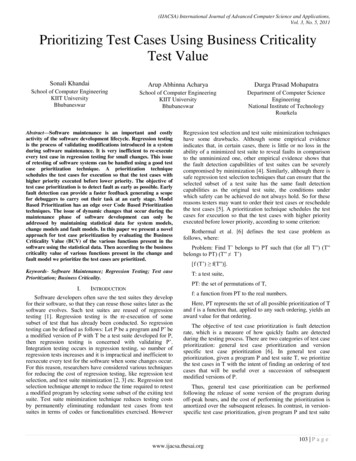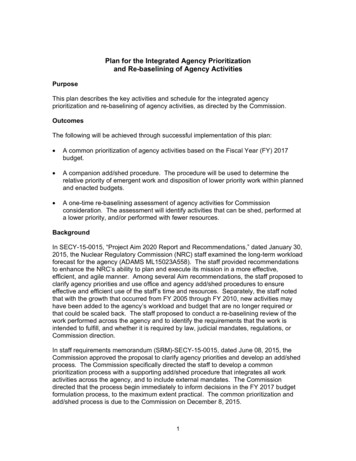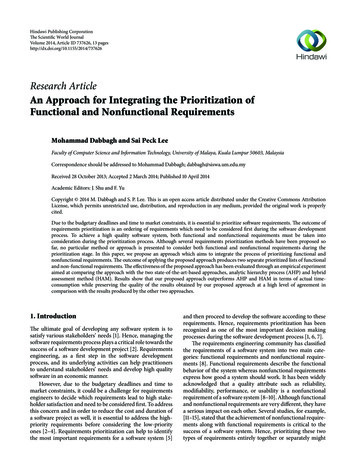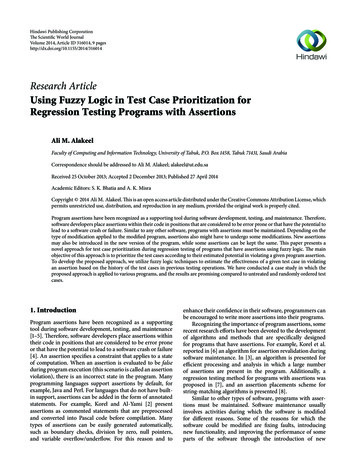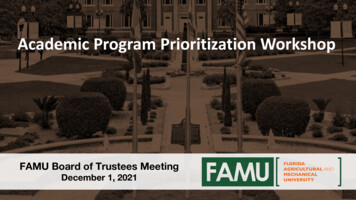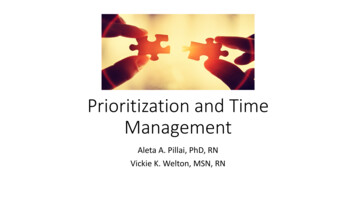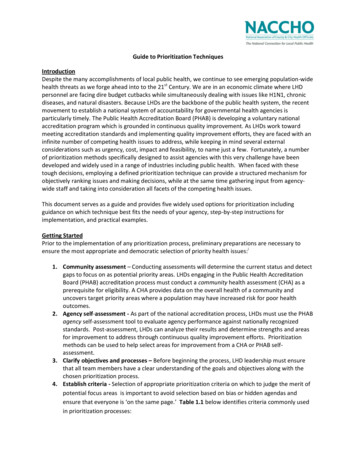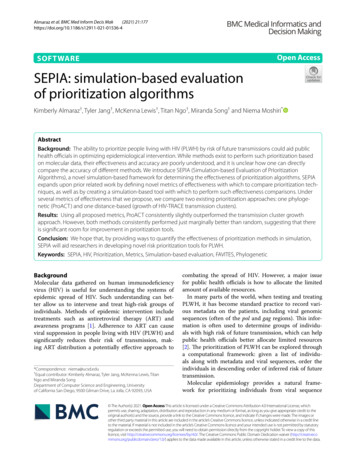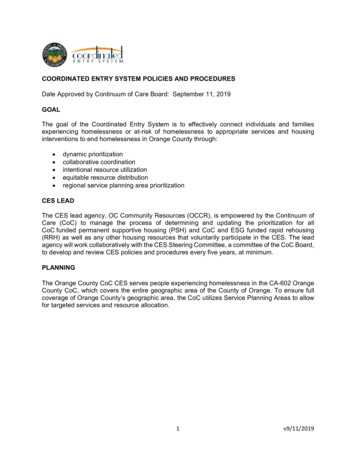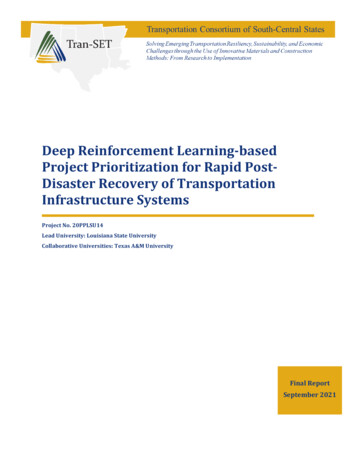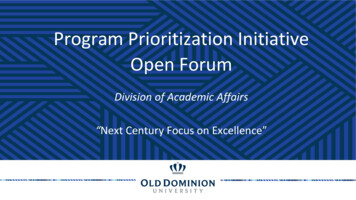
Transcription
Program Prioritization InitiativeOpen ForumDivision of Academic Affairs“Next Century Focus on Excellence”
Members of Prioritization Task Force Members are institutionalrepresentatives and not college ordepartment representatives Members are tasked withidentifying what they believe isbest for the institution “This is not an opportunity forpeople to be assigned based ontheir title or their role. You needindividuals with strong reputations,credibility within the institution,and a willingness to adopt aninstitutional, rather thandepartmental, perspective”(Goldstein)*Judy Bowman is staffing the committeeVinod AgarwalTom AllenNina BrownNina GonserHeather HulingVishnu LakdawalaNorou DiawaraWayne HynesTisha ParedesBrian Payne (co-chair)Desh Ranjan (co-chair)Lynn RidingerJay ScribnerDeanne ShumanMileta TomovicKaren VaughanXiushi YangWie tization
Why?
Why now: The need for reformThe budget reality and future enrollment trends requirethat we take a close look at our academic programs andcourses to determine how the academic affairscommunity believes it should prioritize its resources.
AcademicSub-CommitteesProcessDesh Ranjan
Academic Sub-committeesArts & LettersandHealthSciencesEducation ogyandStromeCollege ofBusinessThree subcommittees wereestablished toreview the academicprograms – each toreview programs in ioritization
Sub-Committee StructureEach sub-committee had 4 members.Members of a sub-committee were chosen from the Collegeswhose programs were not reviewed by the sub-committeeEach sub-committee had a designated lead – responsible formanaging/coordinating the sub-committee work including callingall meetings and ensuring preparation/presentation of reports.Sub-committees were given general guidance for reviewingprograms but were given flexibility in organizing/managing thereview of academic programs in the Colleges assigned to ization
Sub-committee ProcessSub-committees were given general guidance for reviewingprograms but were given flexibility in organizing/managing thereview of academic programs assigned to them.The Rubric developed by the committee for Academic Programsguided the review of the programs. Generally speaking, completingthe rubrics or the completed rubrics provided the starting point fordiscussion of the programs within the sub-committees.This meant looking at extensive amount of data of different type –BLS surveys, Accreditation, WEAVE data, Retention Data, StudentSatisfaction Surveys, Student Enrollments and Credit hours, Budgetdata, UPD, GPD, Chairs and Dean surveys ization
Sub-Committee Process and ReportingEach sub-committee presented a preliminary report of theirprogress in one of the meetings of the whole PPI taskforcePursuant to this each sub-committee reported on all academicprograms within a College at a separate PPI taskforce meetingAll the taskforce members were provided a chance to review allsub-committee reports and provide written feedbackThe sub-committees prepared abbreviated tables based on thesereports for the final itization
AdministrativeSub-CommitteesProcessWie Yusuf
Overview ofDiscussion AboutFinancialsNina Gonser
FinancialDataAdministrative Units Spending by unit Year over year spending variance Spending per Faculty FTE by Unit
FinancialDataAcademic Units Spending by unit Year over year spending variance Spending per SCH by Unit Approx. Tuition Revenue Salary cost by dept. SCH taught by dept. Salary Cost by SCH
Overview ofFuture ProcessMileta Tomovic
Overview ofReport andTimeframeBrian Payne
What the Report Will Look LikeExecutive SummaryBackgroundTask Force l RecommendationsConcluding oritization
Bulk of Findings will be in the form of tablesDepartment /Academic UnitProgramRecommendation*Academic ProgramsAction ItemsRationale / GeneralObservationsAdministrative Units Strategic investment – the institution should investresources to grow or maintain the program. Expand Resources – the institution should investresources to grow or maintain the unit. Maintain as is – no further action is required;program should not lose or gain resources. Maintain as is – no further action is required;unit should not lose or gain resources. Maintain with recommended actions – program isretained, but actions should be taken, such as:reallocate resources to or from the program,revise curriculum, or adjust concentration orcourse offerings; if no action is taken, then therecommendation is to restructure / consolidate. Maintain with recommended actions – unit isretained, but recommended actions should betaken as specific; if no action is taken, then therecommendation is to restructure / consolidate. Restructure / consolidate – program should berestructured or consolidated with anotherdepartment or program. Terminate – program should be terminated. Restructure / repurpose – program should berestructured or repurposed, for example byconsolidating with another unit or be moved intoa college or another administrative unit. Terminate – unit should be terminated.
Additional recommendationsthat will be in the report Changing the certificateapproval process. Developing service levelagreements betweenadministrative units andacademic programs. Developing a strategy toroutinely evaluateadministrative units. Replicating the prioritizationprocess every five to six years. Using this process to supportstrategic planning. Broadening the process toinclude all units at ODU. Prioritizing new programproposals.
Prioritizing Future Programs: New Program RubricAreasCommentsRelates to Mission of ODUYesNoRelates to Vision of ODUYesNoRelates to Strategic Plan of ODUYesNoRelates to Research Priority of ODUYesNoResponsive to Community (external)YesNoAddresses Future EnrollmentChangesYesNoIncentivized by StateYesNoDemonstrated Rationale/Need forDegreeYesNoAboveaverageAs FastAverageBelowAveragePotential for Enrollment GrowthHighMediumLowAmount of Resources NeededSignificantSomeNoneDemonstrated BLS Demand
Timeline Last meeting of task force –May 5 Early May – share draft withdirect reports of the provost Mid-May – share draft withuniversity community onsecure website Solicit confidentialfeedback September 1 – task force willreconvene October 1 – Final reportsubmitted to provost, deans,and faculty senate.
Tenets Guidingthe Process Shared governance Transparent Future-focused Inclusive Use ODU faculty as experts Build on ODU Strengths Academic quality Community Oriented Evidence-based Student success and am-prioritization
QuestionsAndFeedback
Members of Prioritization Task Force. Vinod Agarwal. Tom Allen. Nina Brown. Nina Gonser. Heather Huling. Vishnu Lakdawala. Norou Diawara. Wayne Hynes. Tisha Paredes
